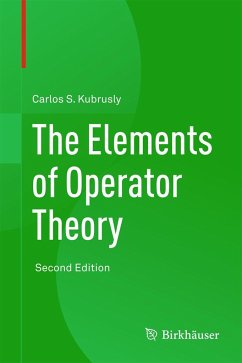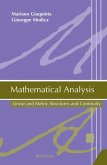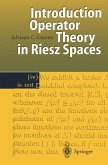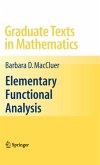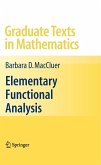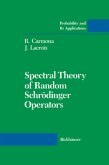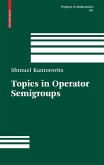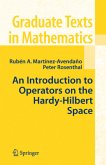This fully revised, updated, and corrected edition of The Elements of Operator Theory includes a significant expansion of problems and solutions used to illustrate the principles of operator theory. Written in a user-friendly, motivating style, it covers the fundamental topics of the field in a systematic fashion while avoiding a formula-calculation approach. The book maintains the logical and linear organization of the title's first edition, progressing through set theory, algebraic structures, topological structures, Banach spaces, and Hilbert spaces before culminating in a discussion of the Spectral Theorem.
A self-contained textbook, The Elements of Operator Theory, Second Edition is an excellent resource for the classroom as well as a self-study reference for researchers. Prerequisites comprise an introduction to analysis and basic experience with functions of a complex variable, which most first-year graduate students in mathematics, engineering, or otherformal sciences have already acquired. Measure theory and integration theory are necessary only for the last section of the final chapter.
Hinweis: Dieser Artikel kann nur an eine deutsche Lieferadresse ausgeliefert werden.
A self-contained textbook, The Elements of Operator Theory, Second Edition is an excellent resource for the classroom as well as a self-study reference for researchers. Prerequisites comprise an introduction to analysis and basic experience with functions of a complex variable, which most first-year graduate students in mathematics, engineering, or otherformal sciences have already acquired. Measure theory and integration theory are necessary only for the last section of the final chapter.
Hinweis: Dieser Artikel kann nur an eine deutsche Lieferadresse ausgeliefert werden.
"The Elements of Operator Theory is a very good treatment of some of the mainstays of functional analysis. It's the book's second edition, the first dating back a decade. But it is also quite an unusual book in the sense that it starts with very elementary material indeed, and, proceeding linearly...takes the reader all the way to the spectral theorem, or at least through the case of compact operators (and compact normal operators). Kubrusly finishes the book with "A Glimpse at the General Case." This is consistent with the fact that while he explicitly aims his treatment at graduate students in mathematics, Kubrusly is also concerned with providing a self-contained reference to fellow travelers.
...Kubrusly's treatment is wonderful. The book is very thorough and clear, and very accessible: it is easy to read even as the material discussed is treated very seriously.
...It certainly would serve beautifully as a text for advanced undergraduates. For beginning graduate students, its utility certainly resides in its clarity and accessibility...Kubrusly includes on the order of 300 exercises in the book, there are many good examples, and he takes the trouble to add both the right kind and amount of motivating commentary and discussions of what might be hiding around the next corner.
The Elements of Operator Theory is quite a good book."
-MAA Reviews (review of the second edition)
"The author endeavors to present the concepts and ideas as an alternative to the computational approach, trying to avoid long calculations by stressing the mathematical thoughts behind the statements. . . . many problems [are] stated throughout the book, very often accompanied by hints."
-Mathematical Reviews (review of the first edition)
"This is a rigorous, logically well-organized textbook presenting basic principles and elementary theory of operators. It is written with great care,gradually increasing in complexity. The forte features of the book are the teaching style, illuminating explanation of numerous delicate points, detailed presentation of topics. Hence, the book can be warmly recommended to a first work for the study of operator theory . . . it is an admirable work for a modern introduction in operator theory."
-Zentralblatt MATH (review of the first edition)
From the reviews of the second edition:
"This is a revised and updated second edition ... which was based on a two-semester course offered by the author for over 20 years. Its intended audience consists primarily of beginning graduate students in mathematics and the sciences, but it may also serve as a reference on the subject of basic single operator theory for nonspecialists. ... Suggestions for additional reading are provided at the end of each chapter." (Thomas Len Miller, Mathematical Reviews, Issue 2012 e)
"This is a revised, corrected and enlarged version of the first edition of this book ... . It collects material suitable for graduate courses as well as for self-study. Each chapter is ended by a large number of carefully chosen problems that present further explanations, help to better understand its subject, and should be considered as an integral part of the course." (Michal Zajac, Zentralblatt MATH, Vol. 1231, 2012)
...Kubrusly's treatment is wonderful. The book is very thorough and clear, and very accessible: it is easy to read even as the material discussed is treated very seriously.
...It certainly would serve beautifully as a text for advanced undergraduates. For beginning graduate students, its utility certainly resides in its clarity and accessibility...Kubrusly includes on the order of 300 exercises in the book, there are many good examples, and he takes the trouble to add both the right kind and amount of motivating commentary and discussions of what might be hiding around the next corner.
The Elements of Operator Theory is quite a good book."
-MAA Reviews (review of the second edition)
"The author endeavors to present the concepts and ideas as an alternative to the computational approach, trying to avoid long calculations by stressing the mathematical thoughts behind the statements. . . . many problems [are] stated throughout the book, very often accompanied by hints."
-Mathematical Reviews (review of the first edition)
"This is a rigorous, logically well-organized textbook presenting basic principles and elementary theory of operators. It is written with great care,gradually increasing in complexity. The forte features of the book are the teaching style, illuminating explanation of numerous delicate points, detailed presentation of topics. Hence, the book can be warmly recommended to a first work for the study of operator theory . . . it is an admirable work for a modern introduction in operator theory."
-Zentralblatt MATH (review of the first edition)
From the reviews of the second edition:
"This is a revised and updated second edition ... which was based on a two-semester course offered by the author for over 20 years. Its intended audience consists primarily of beginning graduate students in mathematics and the sciences, but it may also serve as a reference on the subject of basic single operator theory for nonspecialists. ... Suggestions for additional reading are provided at the end of each chapter." (Thomas Len Miller, Mathematical Reviews, Issue 2012 e)
"This is a revised, corrected and enlarged version of the first edition of this book ... . It collects material suitable for graduate courses as well as for self-study. Each chapter is ended by a large number of carefully chosen problems that present further explanations, help to better understand its subject, and should be considered as an integral part of the course." (Michal Zajac, Zentralblatt MATH, Vol. 1231, 2012)
